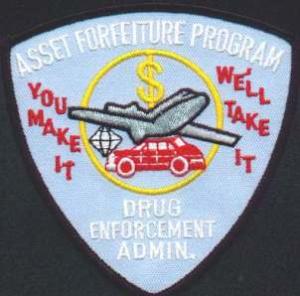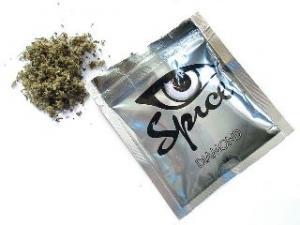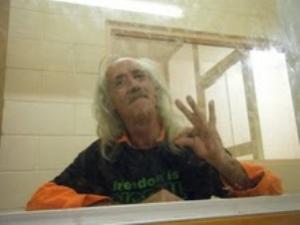A bill that would end federal marijuana prohibition is now before Congress.
Musician Jimmy Tebeau bought a rural Missouri property and turned into a concert venue called Camp Zoe. Now, the feds want to seize it and jail Tebeau over allegations of drug use and sales at concerts there.
A bipartisan group of US Representatives has introduced Congress's first marijuana legalization bill. Please visit our action alert web site to take action in support.
There is a new effort underway to put a pot legalization initiative on the ballot in Washington state next year.
Signature-gathering is about to get underway for an effort to overturn or suspend Montana's harsh new medical marijuana law.
When confronted with new intoxicating substances, legislators' prohibitionist reflexes kick in. Just ask fake pot and "bath salts" users.
Mexico's president feels "misunderstood" about his bloody drug war, but the killings continue despite his hurt feelings.
Ah, the crooked prison guards are back. We missed them last week, but we knew they wouldn't stay away long.
We may be about to see the first defection from the legal backbone of global drug prohibition, the 1961 UN Convention on Single Drugs. Bolivia is ready to dump it, at least temporarily, over its classification of coca as an illicit drug.
New Zealand's marijuana reform community has seen one of its leading lights jailed for eight months, but that never stopped Dakta Green before.
The Lebanese police's annual marijuana eradication campaign in the Bekaa Valley got off with a bang Monday, as police were attacked at least twice.
Events and quotes of note from this week's drug policy events of years past.
Led by Rep. Barney Frank (D-MA) and Rep. Ron Paul (R-TX) a bipartisan group of US representatives last Thursday introduced the first bill ever to legalize marijuana at the federal level. The bill would leave it to the states to decide whether to legalize it at the state level. If the bill were to become law, marijuana would then be treated like alcohol, where states decide whether to ban it and/or what restrictions to place on it.
[Update: The bill has been slammed by a key Republican committee chair and the Obama administration. See the end of the article for more.]

For the first time, a bill to free the weed is before Congress. (image via Wikimedia.org)
Other cosponsors of the bill include Rep. John Conyers (D-MI), Rep. Steve Cohen (D-TN), Rep. Jared Polis (D-CO), and Rep. Barbara Lee (D-CA). The legislation would limit the federal government's role in marijuana enforcement to cross-border or interstate smuggling, allowing people to legally grow, use or sell marijuana in states where it is legal.
The bill does not reschedule marijuana, which is currently Schedule I, the most serious classification under the Controlled Substances Act; it removes it from the act altogether.
"We are introducing a bill today that is very straightforward," said sponsor Rep. Barney Frank (D-MA) at a Capitol Hill press conference Thursday afternoon. "We do not believe the federal government ought to be involved in prosecuting adults for smoking marijuana. That is something the states can handle. We have this problem where those states that want to reform their marijuana laws are prevented from doing so by the federal government. Under this bill, the federal government will concentrate its prosecutorial resources on other things and respect any decision by a state to make marijuana legal," the veteran congressman said.
"We're very excited about promoting a new, sensible approach to marijuana," said Rep. Polis. "We can set up a proper regulatory system, as Colorado has done. It would be wonderful for the federal government to let states experiment. Our current failed drug policy hasn't worked -- marijuana is widely available. By regulating the market, we can protect minors and remove the criminal element so we can focus law enforcement resources on keeping people safe in their communities."
"This has long been an issue of freedom for me," Rep. Cohen told the press conference. "The people are way ahead of the legislators in knowing what the priorities of law enforcement ought to be. The federal government shouldn't be spending its time and money on marijuana, but on crack, meth, heroin, and cocaine. It ought to be up to the states and regulated like alcohol. It should be a matter of individual choice in a country that prides itself on its liberties and freedoms."
The timing for the introduction of the bill is exquisite. Just days earlier, people marked the 40
th anniversary of President Richard Nixon's declaration of the war on drugs with protests and vigils around the country. Earlier this month, the Global Commission on Drug Policy released its report calling for a radical shift in how we deal with illegal drugs, including calling for the legal regulation of marijuana.
The introduction of the bill also comes as activists in at least four states -- California, Colorado, Oregon, and Washington -- are working to put marijuana legalization initiatives on the ballot for 2012. In the case of Washington, there are now two competing legalization initiatives, one aimed at 2011 and one at 2012.
And it comes as legalization becomes an increasingly hot topic in state legislatures. In the past year at least five state legislatures have considered legalizing marijuana, including California, Maine, Massachusetts, Rhode Island, and Washington.
It also comes as the battle between the federal government and states with medical marijuana laws is heating up. Despite the famous Justice Department memo of October 2009, which directed US attorneys to not focus prosecutorial resources on producers and providers in compliance with state laws, the Obama administration is conducting raids at a higher rate than the Bush administration, and US attorneys have recently been on a threat offensive, warning state elected officials their employees could be at risk if they approve the regulation and distribution of medical marijuana.
But while the timing is good, Frank was quick to caution that the bill was unlikely to pass Congress this session. "I don't expect it to pass right away, but given this Congress, I don't expect much good legislation to pass at all," he said. "I think we're making good progress, and the public is ahead of the politicians on this. There is an educational process going on."
Still, that dose of political realism didn't stop advocates, some of whom have been working on the issue for decades, from feeling just a little bit giddy. After all, it is an historic occasion for reformers.
"Adults who use marijuana responsibly should not be treated like criminals," said Allen St. Pierre, executive director of
NORML. "Marijuana smoking is relatively harmless, is not an act of moral turpitude, and should not be treated as a crime. As a marijuana consumer myself, I've never seen my responsible use of marijuana as a crime."
Noting some 22 million arrests of otherwise law-abiding pot smokers since the 1960s, St. Pierre called for the end of pot prohibition. "Policymakers should recognize the benefits of legally controlling and taxing marijuana," he said. "We need to stop arresting millions of people who use marijuana."
"We're so proud to be standing with these members of Congress in announcing this bill to treat alcohol similarly to marijuana," said Aaron Houston, executive director of
Students for Sensible Drug Policy. "A state-based approach to marijuana should be appealing to Republicans. Most people don't know that for decades after the repeal of Prohibition, many states continued to ban alcohol. With this bill, states could continue to ban marijuana, or they could regulate it if they like. This is also an issue that drives young people to the polls, and that's a huge opportunity for politicians."
"This bill is actually the ultimate bill we've been looking for at the federal level," said Rob Kampia, executive director of the
Marijuana Policy Project. "If and when it passes, I expect to close our offices in DC and concentrate on working at the state level. This bill would address some of the stuff we've been hearing about from federal prosecutors threatening state governors and legislators about medical marijuana. If this passes, all the huffing and puffing form US attorneys will evaporate into thin air," he added. "And this bill will have a positive impact on ballot initiatives in California and Colorado in 2012. In the past, opponents said these initiatives wouldn't do anything because the federal government wouldn't touch the issue. Now, we can say the federal government is looking at the issue, and some of the most credible members of Congress are cosponsors."
"Last week marked the 40
th anniversary of the failed war on drugs, so this is very timely, and it comes on the heels of the report by the Global Commission," said Bill Piper, national affairs director for the
Drug Policy Alliance. "This is a major step toward restoring some sanity and science to our nation's drug policies. There is a growth in recognition among both voters and elected officials that marijuana legalization is not a question of if, but when. The reality is that the war on marijuana is unsustainable -- we're heading toward a perfect storm for this."
Now, marijuana legalization is before Congress for the first time since it was outlawed in 1937. While passage this session is extremely unlikely, this is indeed a step forward.
Update: After this article was first published Thursday afternoon, reaction from a key congressional committee chair and the
White House Office on National Drug Control Policy (ONDCP) made it clear that "extremely unlikely" was optimistic.
The bill would have to pass through the House Judiciary Committee, but committee chair Rep. Lamar Smith told the
Associated Press there was no way that was going to happen.
"Marijuana use and distribution is prohibited under federal law because it has a high potential for abuse and does not have an accepted medical use in the US," Smith said. "The Food and Drug Administration has not approved smoked marijuana for any condition or disease."
Then he bizarrely claimed legalizing marijuana in the US would
help Mexican drug cartels. "Decriminalizing marijuana will only lead to millions more Americans becoming addicted to drugs and greater profits for drug cartels who fund violence along the US-Mexico border. Allowing states to determine their own marijuana policy flies in the face of Supreme Court precedent," he threw in for good measure.
Echoing Smith, ONDCP told the
Los Angeles Times legalizing weed was a non-starter. "Our concern with marijuana is not borne out of any culture war or drug war mentality, but out of what the science tells us about the drug's effects. The facts are that marijuana potency has tripled in the past 20 years and teens are using the drug at earlier ages," it said in a statement.
"The earlier a person begins to use drugs, the more likely they are to progress to more serious abuse and addiction --- reflecting the harmful, long-lasting effects drugs can have on the developing brain. Legalization remains a nonstarter in the Obama administration because research shows that marijuana use is associated with voluntary treatment admissions, fatal drugged driving accidents and emergency room admissions," the statement said.
If not this year, maybe next year. If not this Congress, maybe the next one. If not this administration, maybe the next one. There are many obstacles on the path to legalization, but now we are at least on the path.
back to top
Since 2004, when veteran musician Jimmy Tebeau brought the 350-acre rural property in central Missouri and turned it a camping and concert venue, Camp Zoe has been Deadhead central in the Show Me State. A member of the Grateful Dead tribute band The Schwag, Tebeau has hosted numerous Schwagstock and Spookstock festivals, as well as other concerts and events, drawing nationally known acts and thousands of fans for weekends of outdoor fun in the sun.

Jimmy Tebeau (image via campzoe.com)
But the DEA and the Missouri Highway Patrol harshed Camp Zoe's mellow vibe last November, when they rolled into the venue early in the morning and searched the site. A week later, they announced that they were initiating federal civil asset forfeiture proceedings against the property because of alleged rampant drug use and Tebeau's failure to put a halt to it.
According to a
complaint filed November 8 in the Eastern Missouri US District Court, the feds alleged that "over the past several years law enforcement agents have specifically observed the open sales of cocaine, marijuana, LSD (acid), ecstasy, psilocybin mushrooms, opium and marijuana-laced food products by individuals attending the music festival and made multiple undercover purchases of illegal drugs."
Tebeau and other Camp Zoe staff members "were in the immediate area" when drug deals were going down and "took no immediate action to prevent the activity," the complaint continued. It added that "undercover purchases have been made as recently as September 2010," when Schwagstock 45 was held, but noted that the investigation stretched back to 2006 and included evidence from "surveillance, undercover operations, source information, bank records, and interviews."
Most critically, the complaint alleges that Camp Zoe was "knowingly opened, rented, leased, used, or maintained for the purpose of manufacturing, distributing or using controlled substances." In other words, the feds are arguing that the purpose of Camp Zoe was not to be a concert venue, but a drug den, and it could thus be lawfully seized, along with nearly $200,000 in cash they seized from the site and various bank accounts.

good clean fun at Camp Zoe (image from campzoe.com)
The case pitting a local counterculture icon and his property against the power of the federal government has stirred considerable interest in Missouri, as well as among members of the peripatetic Deadhead set. (In fact, I had a conversation about the case with a dreadlocked young woman at a Northern California music festival last weekend.) It has also excited the attention of asset forfeiture reformers and critics of overweening governmental power.
But wait, it's even worse. The feds upped the ante further just a couple of weeks ago. After stalling the asset forfeiture proceedings for seven months -- leaving Camp Zoe silent and vacant and Tebeau without his primary source of income -- and seeing that Tebeau was not about to roll over for them, federal prosecutors last week sought and got a
criminal indictment charging that Tebeau "knowingly and intentionally profited from and made available for use, with or without compensation, said place for the purpose of unlawfully storing, distributing, or using controlled substances."
"This is the sort of things Soviet thugs did and that continues to happen in Russia under Vladimir Putin," said Eapen Thampy, executive director of the Kansas City-based
Americans for Forfeiture Reform. "They take a businessman, take his money, and take him to jail. I see this as an attempt by rich and powerful law enforcement agencies to acquire property or money they can turn into salaries or equipment."

fun and camping at Camp Zoe (image from campzoe.com)
"The Camp Zoe situation is really interesting," said Dave Roland, a St. Louis-based attorney who is director of litigation for the libertarian-leaning
Missouri Freedom Center. "The federal government has recently come back and said they will charge him with maintaining the property for the purpose of facilitating drug transactions, but that seems like an after the fact justification for their attempt to seize the property. The more likely explanation is that the government was embarrassed by the fact people kept saying how can you take this property without alleging he's doing something illegal in the first place," he ventured.
"There was no one engaging in violence at Camp Zoe, there were no allegations of harm or injury," Roland continued. "That the government is concentrating on these sorts of victimless crimes demonstrates misplaced priorities. Especially in light of the financial crunch, we ought to be reallocating resources to deal with real threats to the health and safety of the community and not these drug witch hunts."
But there's the rub. Missouri law enforcement agencies profit handsomely from asset forfeiture, especially when they do an end run around state asset forfeiture law and partner with the feds. Under a 2004 asset forfeiture reform law, funds seized by state and local law enforcement agencies are supposed to go to the state education fund, but that's not what happened.
The
state auditor's reports on asset forfeiture activity show a quick learning curve by state and local law enforcement. While, after the 1994 reforms, schools got 27% of seized funds in 1996 and 1997, in 1998, that figure fell by half to 14%. There was no audit done in 1999, but in 2000 and every year since, schools have gotten 2%, with that figure dropping to 1% in 2008 and 2009. Meanwhile the Justice Department and state and local cops have raked in millions of dollars, gobbling up the vast majority of funds that were supposed to go to Missouri's schools.

FED_DEA_Asset_Forfeiture_Program.jpg
"Asset forfeiture abuse is rampant all over the country," said Roland. "Here in Missouri, the state made an effort to improve its statutes a decade ago, but the problem is that law enforcement agencies find alternative ways to accomplish the same end. Now, you see state and local law enforcement handing cases over to federal agencies because they get a kickback from the asset forfeitures. There is an actual financial incentive to assist federal agencies in the unconstitutional use of asset forfeiture laws."
"Missouri has laws that say how asset forfeiture should be conducted and where the money should go, but they aren't being followed," said Thampy. "When you put this into that context, these abuses are way more serious," he said, adding that he believed 90% of Missouri counties were not in compliance with the law.
Neither Roland nor Thampy were impressed with the criminal charges now being brought against Tebeau. Nor were they aware of other cases of "maintaining a drug premise" being brought against other concert venues. That law is widely known as the "crack house" law.
"The government has a pretty steep hill to climb to prove that Tebeau was operating this camp so that people could buy illegal drugs," said Roland. "I'm very skeptical that the government is going to be able to carry its burden of proof."
"That charge is complete bullshit," Thampy responded bluntly. "If they wanted to charge him with drug trafficking or drug possession, those would be appropriate charges if they could prove them. But charging him with running a drug premise says that he got this land for the sole purpose of conducting drug transactions. It would be putting it mildly to say this is an abuse of prosecutorial power."
"To the best of my understanding, this is not a commonly used statute," said Roland. "I don't recall ever seeing it used in the context of a concert venue owner. They're alleging that the property is being used for the purpose of facilitating drug transactions simply because Tebeau didn't take some unspecified affirmative action."
Now facing criminal charges as well as the seizure of Camp Zoe, Tebeau is still refusing to roll over and cut a deal. With his income-producing property shut down and his bank accounts seized, Tebeau is at a real disadvantage, but thanks to his fans and followers and continuing gigs as a musician, he has so far been able to raise the funds to defend himself.
"A just outcome would be dropping the charges and dropping the attempted asset forfeiture," said Roland. "If we're not going to legalize drugs, the government needs to at least focus on the people and activities they're really worried about. Jimmy hasn't been charged with actually being involved, and it's unjust to target him for a criminal action because someone else was doing something illegal. That's manifestly unjust."
back to top
A high-powered coalition of state and local elected officials, public figures, and attorneys filed a marijuana legalization initiative with Washington state officials June 22. Known as New Approach Washington, the group is aiming to put the measure before voters in the November 2012 elections.
The initiative is distinct from the
Sensible Washington initiative campaign, which had hoped to put its measure before voters in November 2011. The Sensible Washington initiative now appears unlikely to make the ballot because with little more than a week left until it must turn in signatures, it has less than half the required amount and little money to pay signature-gatherers.
Key features of the New Approach Washington initiative include:
- Distribution to adults 21 and over through state-licensed, marijuana-only stores; production and distribution licensed and regulated by Liquor Control Board (LCB).
- Severable provision (e.g. provision would stand if courts invalidated other provisions) decriminalizing adult possession of marijuana; possession by persons under 21 remains a misdemeanor.
- Stringent advertising, location, and license eligibility restrictions enforced by LCB.
- Home growing remains prohibited; except, initiative does not affect Washington's medical marijuana law.
- Estimated $215 million in new state revenue each year, with roughly $40 million going to state general fund (B&O and retail sales tax) and $175 million (new marijuana excise tax) earmarked for youth and health programs and marijuana education programs.
- THC blood concentration of 5 ng/mL or higher is per se Driving Under the Influence.
Among the backers of the initiative are Seattle City Attorney Pete Holmes, former US Attorney for the Western District of Washington (and prosecutor of Marc Emery, ironically) John McKay, travel program celebrity Rick Steves, state Rep. Mary Lou Dickerson (D-Seattle), and ACLU of Washington drug policy honcho Allison Holcomb, who is stepping down temporarily to run the campaign.
The group will have until December 30 to gather 241,153 valid voter signatures to put the issue before the legislature. The legislature could then approve the measure or send it to voters in the November 2012 election.
It's starting to look like marijuana legalization will be on the ballot in at least three, and possibly four, states next year. Efforts are already underway in California, Colorado, and Oregon.
back to top
The state of Montana Tuesday officially approved the petitions medical marijuana advocates want to circulate in an attempt to suspend or overturn a highly restrictive medical marijuana law approved by the legislature this year. Secretary of State Linda McCulloch notified the initiative's sponsor, the Montana Cannabis Industry Association, that Attorney General Steve Bullock had found the petition's language legally sufficient.
The changes in the law, which would wipe out the state's heretofore thriving dispensaries, are set to take effect Friday. But that might not happen. The association filed suit in district court seeking to temporarily block the new law. District Judge James Reynolds of Helena is expected to issue an order Thursday blocking parts or all of the law from taking effect.
Signature gathering will begin after the association trains the hundreds of volunteers who will be collecting signatures, association spokeswoman Kate Cholewa told
The Missoulian Tuesday.
"We want to get everyone trained and trained well," Cholewa said. "There will be some petitions out on the street over the Fourth of July weekend. Everyone wants to do something to contribute, and this is certainly an opportunity."
To suspend the new law, organizers must obtain the signatures of 15% of the voters in 51 of the 100 House districts. That will mean somewhere between 31,238 and 43,247 valid signatures, depending on which House districts are used.
Signatures must be turned in by September 30. If enough voters reject the new law, the 2004 medical marijuana initiative that became law with 62% of the vote would be back in effect.
Montana's medical marijuana melee is far from over.
back to top
Although new synthetics are coming to market faster than governments can ban them, a number of states have moved in recent weeks to criminalize their possession and distribution. In Florida, Louisiana, Minnesota, Pennsylvania, and Wisconsin, state governments have enacted bans on synthetic cannabinoids ("fake pot") or synthetic stimulants ("bath salts"), or both. In South Dakota, they took a slightly different path to arrive at the same end.

Fake pot goes under many brand names. Spice is one. (image via wikimedia.org)
Synthetic cannabinoids are marketed as "incense" under a variety of names, including
Spice and
K-2. They are currently the subject of a one-year emergency ban by the DEA, which is set to expire at the end of February. "Bath salts" are made from methcathinone analogues, typically mephedrone and MDPV, and produce a high likened to cocaine, methamphetamines, and ecstasy. The DEA lists them as a "drug of concern," but has yet to act against them. They are sold under names like
Bliss, Ivory Wave, and the less mellow-sounding
Charley Sheene and
Drone.
In Florida, Gov. Rick Scott (R) signed into law
House Bill 1039 on May 31. It criminalizes the possession of "bath salts" by making them a Schedule I controlled substance. The new law makes permanent an emergency ban on the drugs that went into effect in January.
In Louisiana, the legislature has passed
House Bill 12, which bans both synthetic marijuana and "bath salts." Gov. Bobby Jindal, who in January issued an executive emergency ban on the synthetic stimulants and who made this bill part of his legislative agenda, is expected to sign it shortly. Under the bill, both fake pot and "bath salts" will be classified as Schedule I drugs and their possession or distribution will be punished accordingly. This bill is set to go into effect July 15.
In Minnesota, Gov. Mark Dayton (D) has signed into law
HF0057, which criminalizes bath salts, fake pot, and 2-CE, as well as any substances that are "substantially similar" in chemical structure and pharmacological effects to illegal drugs. That law goes into effect Friday. Although all of the substances are placed on Schedule I of the controlled substances list, possession of fake pot is a misdemeanor and sale of fake pot is a gross misdemeanor. Possession or sale of bath salts or 2-CE is a felony.

"Please do not use as SNUFF," a web site that peddles "bath salts" helpfully advises (ivory-wave.com)
In Minnesota, at least, retailers are fighting back.
Three of them filed suit in Hennepin County (Minneapolis) District Court Monday charging that the law is too vague and broad and is not backed by scientific proof. They also argue that the law provides no criteria for determining if a substance is "substantially similar" to an illegal drug and that the ban infringes on individuals' right to privacy and pursuit of happiness.
Consumers and retailers won't know "if they're committing a crime or not," said attorney Marc Kurzman, who is representing the stores. "You shouldn’t have to get the answer by being charged and going through criminal trials," he said.
In Pennsylvania, Gov. Tom Corbett (R) last week signed into law
Senate Bill 1006, which bans the possession, sale, and use of fake pot, "bath salts," and, for good measure, the psychedelic designer drug 2-CE and salvia divinorum. Possession of the proscribed substances can earn you a year in prison, while sales or possession with intent can get you five years. The law will go into effect in late August, 60 days after it was signed into law.
"If left unchecked, synthetic drugs could have developed into the most dangerous drug crisis since methamphetamine labs found their way into our state,'' Corbett said in a press release announcing his signature. "This ban on synthetic drugs sends a strong message that Pennsylvania will not tolerate the use of these chemicals."
In South Dakota, Gov. Dennis Daugaard (R) back in March signed into law
Senate Bill 34, which will go into effect Friday. In deals with the fake pot and "bath salts" "threat" not by criminalizing them, but by making it a crime to use, possess, manufacture, or distribute them -- or any other substance -- to get high. In South Dakota, it is already a crime to have ingested an illegal drug; now, it will be a crime to ingest legal substances if it is for the purpose of intoxication.
In Wisconsin, Gov. Scott Walker (R) last week signed into law
Senate Bill 54 criminalizing the sale, manufacture, and possession of synthetic cannabinoids and synthetic stimulants. Possession of synthetic cannabinoids is now punishable by up to six months in jail for a first offense and three years in prison for a second offense, while manufacture or distribution garners up to six years in prison. Possession of synthetic stimulants now garners up to a year in jail for a first offense, while distribution of manufacture earns a number of years in prison, depending on the quantity involved.
"By classifying dangerous synthetic narcotics as illegal in the state of Wisconsin we are giving law enforcement the ability to take these destructive substances off of our streets and out of our neighborhoods," Gov. Walker said in a signing statement.
For a master list of states that have banned or are considering banning or otherwise controlling mephedrone and MDPV ("bath salts"), go
here. For a master list of states that have banned or are considering banning or otherwise controlling fake pot, go
here.
back to top
by Bernd Debusmann, Jr.
Mexican drug trafficking organizations make billions each year smuggling drugs into the United States, profiting enormously from the prohibitionist drug policies of the US government. Since Mexican president Felipe Calderon took office in December 2006 and called the armed forces into the fight against the so-called cartels, prohibition-related violence has killed more than 38,000 people, including more than 15,000 last year. The increasing militarization of the drug war and the arrest or killing of dozens of high-profile drug traffickers have failed to stem the flow of drugs -- or the violence -- whatsoever. The Merida initiative, which provides $1.4 billion over three years for the US to assist the Mexican government with training, equipment and intelligence, has so far failed to make a difference. Here are a few of the latest developments in Mexico's drug war:
Wednesday, June 22
In Tamaulipas, the
Mexican military began the process of taking over 22 local police departments, including the violence plagued areas of Nuevo Laredo, Miguel Aleman, Mier, Camargo, Reynosa, Tampico, and Matamoros. The military is expected to secure the areas while new, vetted police are hired.
Thursday, June 23
In Cuahtemoc, Chihuahua,
seven people were kidnapped from a drug rehab center by heavily armed gunmen. At least three of the kidnap victims managed to escape the center but were later discovered by gunmen and forced into a car nearby. Marines investigating the incident discovered 190 packets of cocaine and pot at the center.
In Mexico City,
President Calderon had a public debate with activist and poet Javier Sicilia in which he defended his use of the military against drug cartels while at the same time apologizing to the victims of drug-related violence such as Sicilia's son, who was murdered in Morelos in March along with six friends.
Saturday, June 25
In Ciudad Juarez,
at least eight people were murdered. In
one incident, two transit police officers were shot dead by gunmen who shot them from moving vehicles as the officers were making a traffic stop. It appears the officers were deliberately targeted.
In Monterrey,
four men were lined up against a wall and shot after having been dropped off by a group of heavily armed men in an SUV.
In Veracruz,
Mexican authorities captured Albert Gonzelaz Pena, also known as "El Tigre," who is thought to a high-ranking Zeta commander in charge of Veracruz and the state of Mexico. He is wanted in connection with at least three kidnappings and is thought to be heavily involved in local extortion schemes.
Sunday, June 26
In Ciudad Juarez,
at least seven people were killed. Among the dead were four men who were found dead at a baseball field where they regularly played, and a federal police officer who was shot dead after being chased on foot by gunmen.
Monday, June 27
In the Monterrey suburb of Santa Catarina,
the police chief was gunned down in his office. Chief German Perez was in his office when at least two cars and three trucks full of gunmen arrived at the location and went directly to his office, where he was shot at least eight times.
On Tuesday,
it was announced that seven police officers were being investigated in the incident, as they did nothing. Among the seven were the chief's personal bodyguards.
In Oaxaca, a
priest said that at least 80 Central American migrants had been kidnapped from a train which was carrying them north towards the US border.
Tuesday, June 28
In Mexico City,
President Calderon said he felt "misunderstood" in the government's war on drug cartels, which he launched after taking office in December 2006. He said that many people -- "perhaps silently" -- support the military campaign. As success, he cited that 21 of the country's 37 top drug lords have been killed or captured.
[Editor's Note: We cannot accurately tally the drug prohibition-related killings in Mexico at this time. El Universal, the only Mexican newspaper that was doing so on a regular basis, has stopped. We will have to rely on official pronouncements on the death toll, and will report them when they happen. Below are the numbers through the end of last year. With more than 1,400 reported dead in April alone, this year's toll could well exceed last year's. As of this month, we believe the total death toll has surpassed 38,000.]
Total Body Count for 2010: 15,273
Total Body Count for 2009: (approx.) 9,600
Total Body Count for 2008 (approx.): 5,400
Total Body Count for 2007 (approx): 4,300
Total Body Count for Calderon's drug war through 2010: 34,883
back to top
Ah, the crooked prison guards are back. We missed them last week, but we knew they wouldn't stay away long. Let's get to it:
In Tallahassee, Florida,
a Florida Department of Corrections guard was arrested last Thursday on charges he tried to traffic cocaine to prisoners where he worked. Guard Eric James, 34, was arrested in a sting operation in a local Walmart parking lot as he attempted to buy cocaine to smuggle into the prison. The guy he was getting the cocaine from was actually an undercover officer with the Lake County Sheriff's Office Narcotics Unit. He is charged with bribery and cocaine trafficking. James is being held in the Leon County Jail on $10,000 bond.
In Boston,
a Massachusetts prison guard pleaded guilty in federal court Tuesday to trying to smuggle heroin to sell to inmates at a medium-security prison near Boston. Ronald McGinn Jr. went down after the state Department of Corrections told the FBI someone was smuggling drugs into the prison, and the FBI sent in an undercover officer. McGinn sent text messages and discussed with the officer the amounts he would smuggle and the fees he would charge. He was arrested in possession of 29 grams of heroin in April. He pleaded guilty to possession of heroin with intent to distribute and faces up to 20 years in prison when sentenced in September.
In Greenbelt, Maryland,
a former Prince George's County police officer pleaded guilty Tuesday to selling cocaine and other charges. Sinisa Simic went down in a sweeping federal investigation of corruption in the county. He admitted that he and another man had sold more than 600 grams of cocaine in return for $24,000, as well as protecting shipments of contraband cigarettes. He pleaded guilty to cocaine trafficking, extortion, and two firearms offenses, and faces a mandatory minimum 10-year federal prison sentence when he returns to court for sentencing in September.
back to top

lime powder container (used traditionally in coca chewing), 1st-7th-century, Colombia (Quimbaya), Metropolitan Museum of Art, NY
Bolivia is preparing to withdraw from the 1961 United Nations Single Convention on Narcotic Drugs to protest its classification of coca leaves as an illegal drug. A law that would do just that has already passed the lower chamber of Congress and is likely to pass in the Senate, where the Movement Toward Socialism (MAS) party of President Evo Morales has a two-thirds majority.
The Congress is acting at the request of Morales, a coca union leader. His government sought late last year to amend the convention to reclassify coca leaf, but that effort failed in January, so now Bolivia will withdraw from the convention altogether.
Coca leaf has been used for thousands of years in the Andes, and Bolivia has long argued that coca in its natural state is not an illegal drug, just a plant with traditional, therapeutic, and industrial uses. The Bolivian constitution obligates the government to preserve and protect the chewing of coca leaves as a cultural heritage and ancestral practice.
Under the draft law, which has already passed the lower chamber of Congress and is likely to pass in the Senate, where Morales's party has a two-thirds majority, Bolivia would keep its international obligations in the fight against drug trafficking. Foreign minister David Choquehuanca said the country could rejoin the convention next year, but with a reservation: that it be allowed to consume coca legally.

lime spoons, coastal Inka, Peru, mid-15th to 16th century, Metropolitan Museum of Art
"This is an attempt to keep the cultural and inoffensive practice of coca chewing and to respect human rights, but not just of indigenous people, because this is an ancient practice of all Bolivian people," Foreign Minister David Choquehuanca told the British newspaper
The Guardian Thursday.
Bolivia is the world's third largest coca producer behind Colombia and Peru. Much of the production is diverted into cocaine destined primarily for Brazilian and European markets. Bolivia has intensified its fight against drug trafficking, but says it is fighting a losing battle as long as demand for cocaine remains high in the West.
back to top
One of New Zealand's most prominent and aggressive marijuana legalization advocates will spend the next eight months in prison. Dakta Green was sentenced Tuesday after being found guilty on three marijuana charges earlier this year.

Dakta Green jailed in New Zealand for the herb. (daktagrower.blogspot.com)
For two and half years, Green had operated
The Daktory, a west Auckland club where marijuana could be freely bought and sold. He was charged following police raids on the club in January 2010, after he went public with plans to expand operations and open pot clubs nationwide.
The protests of dozens of Daktory supporters outside the courthouse could be heard inside the courtroom as Green objected to the sentence. But Judge Phil Gittos said the sentence was more lenient that than sought by the Crown and that the "law must be upheld."
It's not the first time Green has been jailed for the herb. He spent a year in the Chester County (Pennsylvania) Jail in 1999 and nearly three years in prison in New Zealand beginning in 2002. But those experiences only strengthened his activism. He legally changed his name from Ken Morgan to Dakta Green in 2008, was a candidate in a regional election for the
Aotearoa Legalize Cannabis Party in 2009, and is a regional director of
New Zealand NORML.
Green shut down The Daktory to its 2,000-plus members after he was convicted. Its motto was "Live like it was legal."
back to top
Lebanese anti-drug police on missions to destroy marijuana fields in the Bekaa Valley came under attack at least twice on Monday, the first day of annual eradication efforts aimed at the valley's deeply-embedded trade in hashish.

marijuana fields just before they are burned (image via wikimedia.org)
"Internal security forces in the Office of Drug Control cooperated with the Lebanese army to raze hashish fields in the northern Bekaa,"
NowLebanon.com reported early in the day before things started heating up. By day's end, Lebanese media would have reason to produce new reports as the clashes broke out.
The
Lebanon Daily Star reported an early morning shoot-out on the Boudai Plain on the outskirts of the city of Baalbek. Later in the day,
NowLebanon.com reported on a second clash near the town of Ollaq. No injuries were reported in either incident.
In the Boudai Plain incident, unknown assailants fired at least five rocket propelled grenades toward police razing the fields. The attackers fled after exchanging gunfire with security forces.
Later in the day, security forces again came under attack as they destroyed a marijuana field in the town of Ollaq. Armed men shot at the eradicators, as well as again launching missiles. The rockets damaged two cars, one belonging to the head of the anti-drug police, Col. Adel Mashmoushi, and one belonging to a Lebanese television network.
"The perpetrators fled the scene in four cars after then 10-minute fire fight," the Lebanese National News Agency reported.
According to the United Nations Office on Drugs and Crime's
2011 World Drug Report, Lebanon is the world's third largest hashish producer, accounting for 6% of global production. Morocco leads with about 19% of global production, followed by Afghanistan with about 10%, and then Lebanon.
After day one of this year's eradication effort, it appears Bekaa Valley hash producers aren't giving up without a fight.
back to top
June 30, 1906: Congress passes the "Pure Food and Drug Act."
July 6, 1919: A Los Angeles Times article entitled "Officers Object to 'Dream Weed' Crop" includes an account of a woman many believe to be the state's first medical marijuana arrestee, a Mexican maid who insists that she was raising marijuana to make tea for stomach trouble.
July 1, 1930: The Porter Act establishes the Federal Bureau of Narcotics (FBN), an agency independent of the Department of the Treasury's Prohibition Unit and consequently unaffected by the passage of the Twenty-First Amendment. Harry J. Anslinger is named acting commissioner, a position he remains in for the next thirty years.
July 4, 1970: First annual 4th of July "Smoke-In" near the White House, still taking place today.
July 1, 1973: The Drug Enforcement Administration is established by President Nixon, intended to be a "super-agency" capable of handling all aspects of the drug problem. DEA consolidates agents from BNDD, Customs, the CIA, and ODALE, and is headed by Myles Ambrose.
July 4, 1997: Amado Carrillo Fuentes, according to the DEA the number one drug trafficker on the planet and chased world-wide, dies in a Mexico City clinic of post-surgery complications. He was attempting to change his face through plastic surgery by having excess fat removed.
July 1, 1998: DEA Chief Thomas Constantine is quoted, "[In] my era everybody smoked and everybody drank and there was no drug use."
July 2, 1999: Robert Vorbeck, 38, is arrested for allegedly selling cocaine to undercover officers. Facing life in prison if convicted of felony drug charges, he commits suicide in his jail cell 11 days later. On July 10, 2001, the AP reports that his estate has been ordered to pay $750,000 to the Nassau County, New York district attorney's office. The ruling, part of a settlement in a civil forfeiture case, is the first in the state in which a prosecutor seeks assets from a dead person.
July 5, 1999: In response to Governor Gary Johnson's call for drug reform debate, organizations in New Mexico form an alliance to examine alternative options to current drug policies.
July 1, 2001: Portugal introduces Europe's most liberal drug policy to date with the implementation of new laws establishing no criminal penalties for using and possessing small amounts of not only cannabis but also hard drugs such as cocaine, heroin and amphetamines.
July 4, 2001: Sir Keith Morris, Britain's former ambassador to Colombia, is quoted in The Guardian: "It must be time to start discussing how drugs could be controlled more effectively within a legal framework. Decriminalization, which is often mentioned, would be an unsatisfactory halfway house, because it would leave the trade in criminal hands, giving no help at all to the producer countries, and would not guarantee consumers a safe product or free them from the pressure of pushers. It has been difficult for me to advocate legalization because it means saying to those with whom I worked, and to the relatives of those who died, that this was an unnecessary war. But the imperative must be to try to stop the damage. Drug prohibition does not work."
July 3, 2003: The Drug Policy Alliance (DPA) announces the results of a California Latino voter poll: 65% oppose jailing young, first-time marijuana sellers, 85% oppose jail for marijuana possession, and 58% oppose jail for possession of "hard drugs."
back to top















